News
05 Greatest Trophies Across Different Sports
- FIFA World Cup Trophy

- Awarded For: Winning Football World Cup
- Made of: 18-carat gold
- Introduced in: 1974 FIFA World Cup
- Designer: Stabilimento Artistico Bertoni (Italy)
The trophy is given to the World Cup-winning team every four years, the “FIFA World Cup Trophy” is made of gold and it replaced the first world cup trophy called “Jules Rimet Trophy” after the 1970 world cup. It was first introduced in the 1974 world cup and made of pure 18-carat gold and weighs around 6.1 kilograms. Its design feature two human bodies holding earth”.
2. The Ashes (Cricket)

- Awarded for: Winner of annual 5 test match series between England-Australia
- Made of: terracotta and contains a burnt bail
- Introduced in: 1883-84 test series between England-Australia
Early history accounts vary but its widely considered that after 1882 test series win by Australia in England. British newspaper “Sporting times” published an article about “death of cricket in England and Ashes set to be taken to Australia” referring to Australia win against England. A year later when England travel to Australia for the test series, English captain vowed to take back the Ashes.
3. Wimbledon (Men’s singles Tennis)

- Awarded For: Men’s singles winner
- Made of: Silver Gilt, Height 18 inches
- Introduced in: first presented by All England Club in 1887, it replaced the Field Cup used in previous 6 years.
First ever Wimbledon Championship took place in 1877 and a trophy called “Field Cup” was awarded to the winner of men’s singles event. But William Renshaw won three titles in a row twice hence keeping the “field cup (1877-83) and Champions Cup (1984-86). That prompted All England Club to present a new trophy to the winner which was made of silver gilt and it was decided that players cannot keep the trophy no matter how many times they win the event.
4. Webb Ellis Cup (Rugby)
- Awarded For: Winning Rugby Union World Cup
- Made of: Gilded silver, weights around 4.5 kg
- Introduced in: 1987 Rugby World Cup
- Designer: Carrington & Co. of London designed the original trophy back in 1906
The Webb Ellis Cup was introduced in the first Rugby Union World Cup and awarded to the winner. The trophy used was actually a historic silverware made back in 1906 by Carrington and Co of London. When Rugby World Cup 1987 was announced, secretary of International Rugby Federation set off on finding an appropriate trophy for the world cup and he visited “Garrard & Co” Jewelers in London where this trophy was shown to him. He liked the design and presented it to Rugby countries participating in the first every world cup.
5.Stanley Cup (NHL)
- Awarded For: Winning playoffs in National Hockey League (NHL)
- Made of: Silver and nickel alloy, weighs at around 15.5 kilograms
- Introduced in: 1893 for the best amateur ice hockey team in canada
- Designer: Named after Lord Stanley, who brought a simple rose-bowl which was made in Sheffield England and used it as a trophy awarded to Canada’s best amateur hockey team every year.
Stanley Cup has a rich history and it is named after its very first owner Lord Stanley who was the governor of Canada in last 1880’s to early 1990’s. He was ICE Hockey enthusiast. Lord Stanley alongside his family played a key role in Ice Hockey development in Canada starting an yearly amateur “Dominion Hockey Challenge Cup”.
Cricket
South Africa misses yet another ICC trophy as NZ knocked South Africa out in Semis
South Africa’s long wait for an ICC trophy continued as they suffered another heartbreaking exit, this time at the hands of New Zealand in the first semi-final of the ICC T20 World Cup 2026 at Mumbai on Wednesday. The Proteas, who had finished runners-up in the last edition, were outplayed by nine wickets in a contest that highlighted both their misfortune and New Zealand’s ruthless efficiency.
Batting first, South Africa managed 169 for 8 in their 20 overs. Captain Aiden Markram and Quinton de Kock fell cheaply, leaving the middle order under pressure. Dewald Brevis showed promise with a fluent 34, while Tristan Stubbs added 29. The standout was Marco Jansen, who smashed an unbeaten 55 off just 30 balls, lifting the total to a competitive score. Yet, frequent wickets at crucial stages meant South Africa never truly seized momentum.

New Zealand’s reply was nothing short of brutal. Finn Allen launched a stunning assault, hammering 100 off just 33 balls, including 10 fours and 8 sixes. Tim Seifert’s 58 ensured the chase was never in doubt, and the Black Caps cruised home in just 12.5 overs. South Africa’s bowlers, including Jansen and Bosch, were taken apart, with economy rates soaring above 11.
Cricket
Navin Dissanayake Concedes Error Over 2015 Sri Lanka Cricket Election
Former Sports Minister Navin Dissanayake has admitted that his decision in 2015 to cancel the Sri Lanka Cricket elections and appoint an Interim Committee was a serious mistake. The move, which blocked Nishantha Ranatunga from becoming president, has long been debated in cricketing circles, and Dissanayake’s recent reflection has reignited discussion about missed opportunities in the sport’s governance.
In a candid post on X, Dissanayake acknowledged that he should have supported Ranatunga, who served as SLC Secretary from 2009 to 2015. That period is widely regarded as one of the most successful eras in Sri Lankan cricket, with the national team reaching multiple finals and securing major titles. “In hindsight I should have backed Nishantha and ensured he won the election without problems with the ICC,” Dissanayake wrote, admitting regret over his decision. He revealed that despite warnings from advisors that the International Cricket Council would not approve an Interim Committee, he went ahead with the appointment, leading to two years of negotiations over reforms. He also pointed to political interference at the time, saying the environment did not allow him to support Ranatunga’s election.
Ranatunga’s tenure as Secretary coincided with a golden run for Sri Lanka. Between 2009 and 2015, the team reached the finals of the 2009 T20 World Cup, the 2011 Cricket World Cup, and the 2012 T20 World Cup, before finally clinching the 2014 T20 World Cup and the 2014 Asia Cup. Serving under presidents DS de Silva, Upali Dharmadasa, and Jayantha Dharmadasa, Ranatunga was credited with a steady and effective administrative role that helped guide the team through this remarkable period.
Dissanayake’s admission comes at a time when Sri Lankan cricket is once again under scrutiny, following a disastrous campaign at the ongoing T20 World Cup. His remarks have reopened old wounds and revived questions about what might have been had Ranatunga been elected in 2015. With the sport facing another crossroads, the former minister’s reflection underscores the long-standing challenges of governance and political interference in cricket administration, and the lingering sense of opportunities lost.
Cricket
Hasini’s Half-Century Powers Sri Lanka Women to Historic Series Win in the Caribbean
Sri Lanka women’s national cricket team scripted history on Tuesday night by clinching their first-ever T20 series win in the Caribbean, sealing the three-match series 2-0 with a commanding nine-wicket victory over West Indies women’s national cricket team at St. George’s.
After the opening match was washed out, Sri Lanka seized control by winning the second T20. Their emphatic performance in the decider capped off a memorable tour, having already secured the ODI series 2-1.
Disciplined Bowling Effort
Batting first, West Indies Women posted 119/5 in their 20 overs. A fluent 32 off 15 balls from Chinelle Henry provided early momentum, while Deandra Dottin (28) and Stafanie Taylor (24) attempted to stabilise the innings.
However, Sri Lanka’s bowlers maintained tight control. Inoka Ranaweera was outstanding with figures of 2/16, while Sugandika Kumari supported with two wickets. Kavisha Dilhari also chipped in with a tidy spell.
Composed Chase Seals the Series
Chasing 120, Sri Lanka’s batting unit delivered with confidence and composure. Captain Chamari Athapaththu set the tone with a brisk 32 off 22 balls, striking five boundaries to put the visitors ahead of the required rate.
Following her dismissal, Hasini Perera anchored the innings superbly, crafting an unbeaten 52 from 59 deliveries. She was well supported by Imesha Dulani, who struck an aggressive 34 off 25 balls, guiding Sri Lanka to 121/1 in 17.4 overs.
The victory marks a significant milestone for Sri Lanka Women, underlining their growing confidence and consistency on the international stage.
Brief Scores
West Indies Women – 119/5 (20 overs)
Chinelle Henry 32* (15), Deandra Dottin 28 (39), Stafanie Taylor 24 (39)
Inoka Ranaweera 2/16, Sugandika Kumari 2/32, Kavisha Dilhari 1/13
Sri Lanka Women – 121/1 (17.4 overs)
Hasini Perera 52* (59), Imesha Dulani 34* (25), Chamari Athapaththu 32 (22)
Afy Fletcher 1/14
-
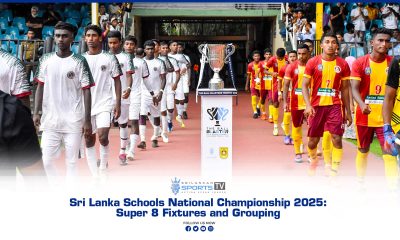
 Football1 year ago
Football1 year agoSri Lanka Schools National Championship 2025: Super 8 Fixtures and Grouping
-

 News1 year ago
News1 year ago2025 Schools Rugby Season Set to Thrill Fans with Knockout and League Action
-

 Cricket9 months ago
Cricket9 months agoNuwan Thushara Shines as RCB Storms into IPL 2025 Final
-

 Live4 years ago
Live4 years agoLive Broadcast of Syria vs Sri Lanka | AFC U23 Asian Championship Qualification
-
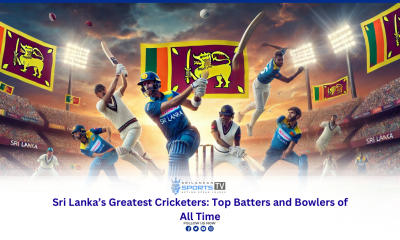
 Cricket1 year ago
Cricket1 year agoSri Lanka’s Greatest Cricketers: Top Batters and Bowlers of All Time
-
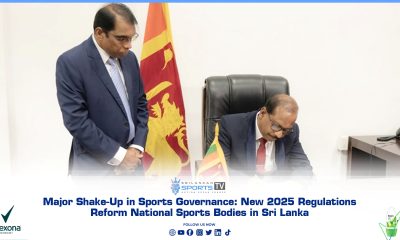
 News9 months ago
News9 months agoMajor Shake-Up in Sports Governance: New 2025 Regulations Reform National Sports Bodies in Sri Lanka
-
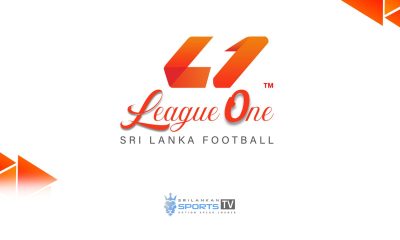
 Football1 year ago
Football1 year agoFFSL Rebrands Division-1 as ‘League-One’ with a Bold New Vision
-
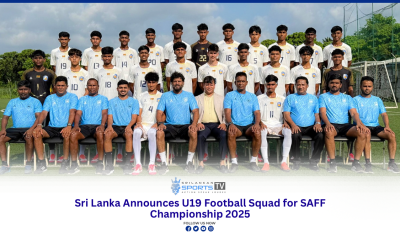
 Football10 months ago
Football10 months agoSri Lanka Announces U19 Football Squad for SAFF Championship 2025







